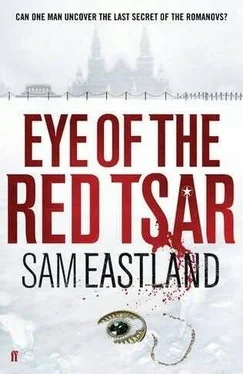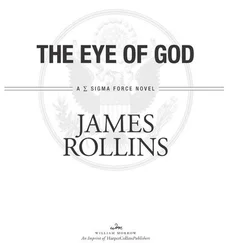“Oh, it exists,” the manager assured him. “Only”-he hesitated-“there is no land to the south.”
“No land? Have you completely lost your mind?”
“Do you have your map with you?” asked the manager.
“Yes.”
“Then take a look at it and you’ll see what I mean,” he said.
With the manager standing beside him, Anton spread his map out on the hood of the car. It took him a moment of staring at the chart before he had his bearings.
“There’s the road,” said Anton, tracing his finger along it.
Now the manager dabbed one diesel-greasy finger at a large white space south of the town, through which the dark blue vein of road became a dotted line.
“I didn’t notice that before,” said Anton. “What does it mean?”
From the look on the manager’s face, it was clear that he knew but had no intention of saying. “Go around,” he said, pointing to another road which meandered to the south and then looped around, eventually trailing into Vodovenko.
“But that will take days!” said Anton. “We don’t have the time.”
“Suit yourself,” replied the manager.
“What aren’t you telling us?” asked Pekkala.
The manager lifted another fuel can and placed it in Pekkala’s arms. “Take this with you, just in case,” was all he would say.
IT WAS LATE AFTERNOON WHEN THEY ARRIVED AT THE EDGE OF THAT emptiness on the map. They came upon a roadblock made from a tree trunk set across the road at waist height, supported on either side by two X-shaped wooden structures. A small hut had been built beside the road.
A guard stood in the middle of the road, holding out his arm for them to stop. In his other hand, he held a revolver attached to a lanyard which hung around his neck. His ears were pressed back close against his skull, giving him a predatory look. On his collar he wore the red enameled rectangles of an officer.
Another man dozed in the darkness of the hut, arms folded and head lolling.
Pekkala noticed that beyond the roadblock, the fields were green and cultivated. In the distance, the thatched rooftops of a village seemed to glow in the midday sun.
Anton had seen it too. “According to the map,” he said, “that village does not exist.”
Kirov stopped the car but kept the engine running.
The officer stepped over to his window. “Out,” he snapped. “All three of you.” By now the second guard had emerged from the hut. He had wide, deep-set eyes and a dark beard which straggled across his face. He buckled on a gun belt and joined his companion at the car.
While Anton, Pekkala, and Kirov stood by the roadside, the two guards searched the vehicle. They opened the fuel containers and sniffed the liquid inside. They inspected the cans of army ration meat. They pawed through the coils of bristling hemp rope. Finding nothing, the first guard finally addressed himself to the three men. “You are lost,” he said.
“No,” replied Kirov. “We are on our way to Vodovenko.”
“I am not asking you if you are lost. I am telling you.”
“Why is there nothing on the map?” asked Anton.
“I am not allowed to answer that question,” the officer said. “You are not even permitted to ask it.”
“But how do we proceed?” Anton asked. “This is the only road heading south.”
“You will have to turn around,” said the officer. “Go back the way you came. Eventually, you will reach a crossroads. From there, you can go north. And then”-he rolled his hand in the air-“after some hours, you will find another road heading east.”
“Hours?” shouted Kirov.
“Yes, so the sooner you get started…”
Anton rummaged in the pocket of his tunic.
As he did this, the second guard reached slowly down and undid the flap on his gun holster.
Anton removed a sheaf of orders typed on thin, waxy paper, grayishly transparent, the last one signed at the bottom with ink which had soaked through the page. “Read this,” he said.
The officer snatched the papers. He glanced at each of the three men in turn.
The Emka’s engine burbled patiently, filling the air with a smell of exhaust.
The second guard leaned over the officer’s shoulder, reading the orders Anton had given them. He made a faint choking sound. “The Emerald Eye,” he said.
One late September afternoon, Pekkala was summoned to the Catherine Palace, which was on the grounds of the Tsarskoye Selo estate.
Pekkala arrived late. That afternoon, in Petrograd, he had testified at Grodek’s trial. The hearings lasted longer than expected. By the time the tribunal had released Pekkala from the witness stand, he was already overdue.
He guessed that the Tsar would not have waited up, but would already have returned to his quarters for the night. Without any way to confirm this, and with no idea what the Tsar wanted, Pekkala decided to make his way to the palace. In his two years as the Tsar’s Special Investigator, he had often been summoned without knowing the purpose of his visit until after he arrived. The Tsar did not like to be kept waiting. He was a man of disciplined habits, his days rigidly scheduled between meetings, meals, exercise, and time with family. Anyone who upset this balance was not dealt with kindly.
To Pekkala’s surprise, the valet who met him as he entered the Catherine Palace explained that the Tsar had waited after all. The next surprise came when the valet told him the Tsar was expecting him in the Amber Room.
The Amber Room was unlike any other place on earth. Pekkala had heard it described as the Eighth Wonder of the World. Few people outside the immediate family were allowed inside. It was not a large room, a little over six paces wide by ten paces long and the height of two tall men. Nor, in comparison with other rooms in the Catherine Palace, did it have the most spectacular view from the windows which lined one of its walls. What made the room remarkable was the walls themselves. Covering them from floor to ceiling were panels inlaid with over half a million pieces of amber. Wooden mosaics on the floor mirrored this dizzying collage of fragments, and a glass case in the corner contained trinkets made from the fossilized sap-cigar cases, music boxes, hairbrushes, an entire chess set whose pieces were carved from amber.
When light poured through the windows, the walls would glow as if they were on fire, radiating heatless flame from somewhere deep inside. At moments like this, the amber appeared to be like a window into a world of perpetual sunset.
In spite of finding himself so often surrounded by the priceless possessions of the Tsar, Pekkala did not covet them. He had grown up in a house where beauty had been found in simplicity. Tools, furniture, and cutlery were appreciated for their lack of frivolousness. To Pekkala, so much of what the Tsar owned struck him as merely impractical.
Pekkala’s lack of interest in such wealth confused the Tsar. He was used to people being jealous, and the fact that Pekkala didn’t envy him troubled the Tsar. He would try to interest Pekkala in the ivory and ebony inlay of a desk, or a damask-barreled set of dueling pistols, even going so far as to offer them to Pekkala as gifts. Pekkala usually refused, accepting only small tokens and then only when the Tsar would not take no for an answer. In the end, it was the Tsar who envied Pekkala, and not the other way around, not because of what the younger man had, but because of what he did not need.
But the Amber Room stood apart from all the other treasures of the Tsar. Even Pekkala could not deny the spell it cast on those who saw it.
As he passed through the White and Crimson Dining Rooms, Pekkala noticed a tall man in military uniform emerging from the Amber Room. The man closed the door behind him and, with a spring in his step, strode through the Portrait Gallery.
Читать дальше










